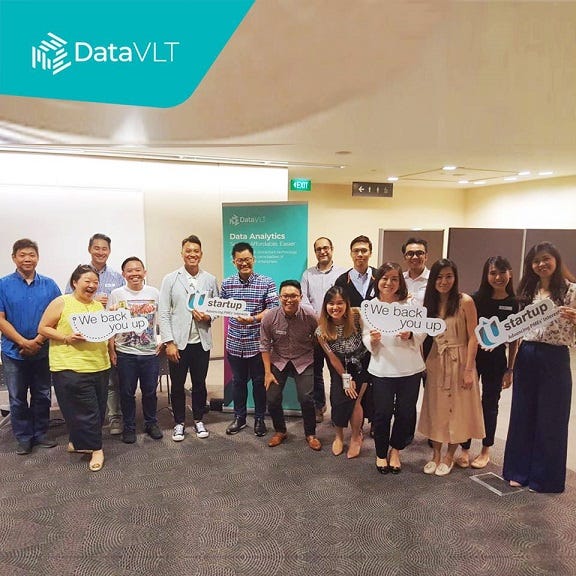
What’s your story?
It began over coffee amongst 3 long-time friends discussing employee empowerment, tech, red tape limitations and the unfortunate closures of family businesses that belonged to common friends. A huge realisation hit us when we started seeing declining numbers of SMEs in Singapore — this is not an encouraging sign for any local economy. That’s when we decided that we should do something to help the middle tier market SMEs in the region take it to the next level in the dawning digital economy and aid the underserved. This led to conversations gravitating around the latest emerging technologies and the potential for it to be used as a force for good.
Like any other technology enthusiasts, we were fascinated with the still growing potential of decentralized systems and data science, and how the two-combined can redefine industries to solve real-world challenges affordably.
Thus, DataVLT was born in 2017. The objective is to provide a powerful data analytics platform (secured by blockchain) that enables businesses to use advanced analytic techniques easily — without extreme investment costs.
Based in Singapore, DataVLT is on a mission to empower the digital future.

What were some of the obstacles that your company faced during its initial years and how did your team overcome it?
Hiring the right talents across all departments was a key challenge. High-tier skillsets were needed to kickstart marketing and development efforts. At the same time, we wanted to make employee empowerment a reality for our staff. Achieving that balance took time, but we managed to pull it off and formed our dream team.
How does your company separate itself from its competitors?
We leapfrog the barriers to adopt advanced analytics so that small-to-large businesses can easily predict trends, profile data and even automate decision making. The perception that data analytics is only for big MNCs with deep pockets doesn’t need to hold true. DataVLT is offering the possibility of reducing the investment that goes into resourcing efforts like hiring the right skill-sets and setting up the infrastructure. Essentially, we bridge the financial and knowledge gap for companies with an easier and affordable pay-per-use platform.
In what situation can data analytics help companies?
Two Examples:
Facilitate Better Decision Making with Automation — Recommendation engines are advanced analytics that combines historical data such as customer profile, sales data, weather and economy indicators to categorize scenarios and its outcomes. The engine can then recommend decisions to obtain ideal results.
Process Chain Sustainability — Imagine unpredicted downtimes for your business, especially for businesses that rely heavily on their supply chain. One such use case is predictive maintenance. Machineries churn out millions of data points every hour. By identifying key indicators that signal oncoming failure enables businesses to service their machines early to avoid unexpected & costly lapses. This can be applied to hospitals, production lines, servers, oil pumps, automotive, etc.
What are your thoughts on cybersecurity and blockchain?
It’s important and very necessary, especially with our increasing dependency on digital connectivity. Cybersecurity is a broad topic and has many aspects to it. It can involve protection from theft, tampering, spying, and denial of services amongst other things. Everything is hackable if done correctly.
Even though investing in cybersecurity has become a mandate in most organisations, resource constraints make it difficult for smaller companies to make it a priority. This situation presents opportunities for the integrated development of cybersecurity in combination with blockchain solutions to offer data security to companies, and interestingly, the blockchain tech makes it incredibly hard to crack into because of 3 key areas:
1. Cryptography built into blockchains encrypts the data and prevents malicious actors from stealing or reading the data — unless they have the decryption keys.
2. The decentralized network of the blockchain keeps the data online even when one or more nodes are brought offline. The larger the network of nodes, the harder it is to take the network down.
3. Distributed Ledgers protects the data from being tampered. Much has been said about this aspect. Ultimately distributed ledgers create a system of trust that enables us to store records we want unalterable (i.e. historical reports, ownership of assets, transactions, etc)
Despite being in the nascent stage, blockchain has proven to be a great asset in the future of data distribution. Companies will be able to share large amounts of data via the distributed ledger within minutes, making it an attractive alternative.
What is one of the most memorable learning experience of your entrepreneurial journey?
Seek and you shall find. One of the most memorable learning experiences, for me, is realising the importance of being able to succinctly communicate the ambition and roadmap for our solution to the real-world challenge that we are trying to resolve. This can change the way investors and potential customers look at your company and products.
The delivery in the belief (in your company/product), stemmed from conviction, purpose and in-depth know-how (to develop and deliver), also plays a vital role in converting speculators into believers.
To clarify, I am not talking marketing fluff.
One of the many turning points for us was fathoming that we had been communicating with our technical ‘hat’ on. The frustration we faced, then, was not understanding why few seemed to grasp the value that we can bring to the table. We were not getting feedback on the way we positioned ourselves until we started asking the right questions. The right questions will not yield pleasant answers but, if allowed, perhaps the most insightful and valuable ones.
What do you think should be the most important characteristic of a startup and its team to possess?
Objectivity. The most important of all characteristics is focused objectivity applied to your solutions and business. It is easy for start-ups to forget why they started their journey and the initial challenges that they want to resolve. Don’t get me wrong, it’s not about inflexibility. It’s about having clarity in times of uncertainty and fluidity. It’s also about ensuring that you are not putting the cart in front of the horse.
Adaptability. Every company (startup or otherwise) is subjected to unexpected events that can derail operations. The ability to stay nimble, adapt and turn disasters into opportunities lays the foundation for growth and innovation. Don’t misconstrue this as ‘changing minds and decisions for the sake of’ but rather steering the obstacle course to your advantage.
Openness to learning, feedback and change. Over the years, entrepreneurs have earned the reputation of being arrogant, resistant to change and fixated with ideas. The few successful ones are those who have constantly put themselves out there and are open to receiving feedback from every aspect. Being humble and flexible can help to see efforts bear fruit faster than those who refuse to adapt necessarily to scale.

What are you working on right now that motivates you to get out of bed in the morning?
That’s a secret. But the one thing that we can share is the fact that we are making palatable big words such as ‘digital transformation’, ‘data analytics’ and ‘artificial intelligence’ with real-world support and manageable solutions. Right now, we are already impacting parts of the retail, manufacturing and human capital sectors. The positive feedback has been keeping us humble and excited.
Having said that, just to share a little more, we’re consistently refining our models, tools and algorithms. Simultaneously, we are preparing to launch two applications that aim to connect professionals seamlessly without the hassle of business cards and a nimble training tool that aids on-the-job training respectively.
What is your company’s five-year plan? Any market expansion plan in the pipeline?
We have just reached the 1st year of official operations and we’re already piloting projects across several markets in APAC namely Singapore, Thailand, Indonesia and Australia. Our ambition is to take this locally grown start-up and nurture it into an established market player by the 5th year. Then, we will be spearheading various applications and, more importantly, a differentiated approach to data analytics coupled with a dynamic platform that hosts a plethora of analytics and machine-learning algorithms to answer multiple business problems that SMEs around the world can affordably tap into.
Looking back, what advice would you tell your younger self?
I would have told myself to be fearless. What I have come to learn and realise, and still discovering today, is that each and everyone of us is a powerline. We are only as good as the limitations we set ourselves — from what we think we can and cannot do to what we should and should not try to do.
Next, I would tell myself to be more thoughtful. Give everything a chance, view it from different perspectives, communicate with objective intent and not to jump to conclusions unnecessarily. It is all too easy for us to knock someone down without consideration and yet, it is all so difficult to get back up when you are the one receiving the punch.
Lastly, I would tell myself to be more tenacious. No one, no matter how connected or supported, knows everything about anything. It is up to us to take the initiative to search, discover and learn rather than wait to be provided. This leads to one of the philosophies that I currently live by — In life, no one owes you anything but that you owe everyone else something.

